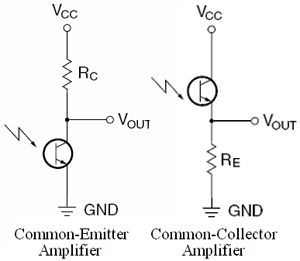Difference between revisions of "Photodiodes and Phototransistors"
From Mech
Jump to navigationJump to searchm |
|||
| Line 6: | Line 6: | ||
The phototransistor can be used in two different modes: 1) active & 2) switch. These modes are controlled by changing the value of the resistor. The equations are: |
The phototransistor can be used in two different modes: 1) active & 2) switch. These modes are controlled by changing the value of the resistor. The equations are: |
||
[[image:phototransistor modes.png |
[[image:phototransistor modes.png]] |
||
''Fairchild'' recommends a 5kohm resistor or greater to use as a switch. |
''Fairchild'' recommends a 5kohm resistor or greater to use as a switch. |
||
Revision as of 14:18, 6 July 2006
Phototransistors
Phototransistors are transistors with the base terminal exposed. Instead of applying a voltage to the base, the photons from striking light activate the transistor.
The phototransistor can be used in two different modes: 1) active & 2) switch. These modes are controlled by changing the value of the resistor. The equations are:
Fairchild recommends a 5kohm resistor or greater to use as a switch.
- Switch Mode - when operating as a switch, the transistor can be switched between the cut-off ("off") and saturated ("on") states. This means that when light strikes the phototransistor, it will conduct. Otherwise, it will insulate.
- Active Mode - In active mode, the output of the transistor is proportional to the intensity of the light.
References
- Fairchild Semiconductor, "Design Fundamentals for Phototransistor Circuits," PDF, http://www.fairchildsemi.com

